










Newly appointed Minority Leader in Parliament Dr. Ato Forson has disclosed that the opposition National Democratic Congress (NDC)caucus will soon commence a nationwide roadshow to illustrate the dire economic situation of the country to the populace.
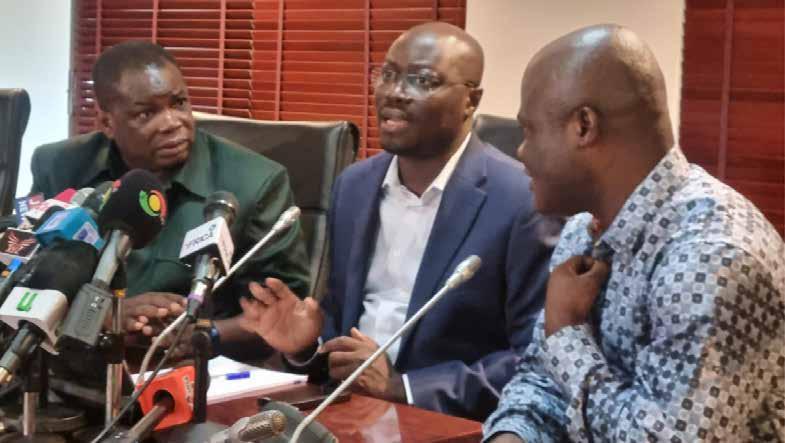
Addressing his maiden press conference at parliament house in Accra on Thursday, the Ajumako-Enyan-Essiam MP said “we will also embark on a roadshow where we will galvanise the people of Ghana to educate them on the meaning of what this economic crisis is going to take us through.
tion in more than two decades.
54.1% year-on-year in December, up from 50.3% the previous month and its highest level in 22 years, driven by fuel, utilities and food, the statistics
The country approached the IMF in July for help after investor concerns about ballooning government debt forecast to exceed the size of its economy
tively locked the country out of global capital markets.
The West African nation has over US$3bn with the fund S&P Global Market Intelligence
forecasts that the economy will expand 3.5% this year, down from 4.6% in 2022.

Further, the Minority Leader urged the President to downsize his government, cautioning that they will not accept any move to increase government.
“I wish to send a message to the NPP that the people of Ghana have fallen on them to downsize mood of the country -you are asking people to forgo their coupon, you asking the ordinary if the President intends to be known that we in the NDC, will not accept an attempt increase the size of government. And if the current size of his ministers increases by one, that one person will not receive our cooperation.”

He also indicated that they have engaged with the Finance and Health Committees to conduct a public hearing of the Covid-19 expenditure beginning on the 7 February, 2023, saying “at that point we will pay due diligence to the duties given to us by the people of Ghana.”
He added that he has been humbled by the party’s decision to elevate him as a member of the caucus, adding he has held fruitful engagements with the former Minority Leader, Haruna Iddrisu.
“I am honoured and humbled to have been chosen to lead our illustrious and gallant caucus in Parliament. I thank the leadership of our party who have placed
am also deeply grateful to our party and the Ghanaian people for their profound support and solidarity.”
The new leader singled out the outgoing Minority Leader, Haruna Iddrisu, and commended him for his admirable stewardship when he led the caucus and assured that he will represent the collective interest of the NDC.
“I have held fruitful and positive conversations with my senior brother Hon. Haruna Iddrisu. I commend him for his admirable stewardship when he was granted the opportunity by our party’s leadership.”
“As a leader, it will be my duty to represent our collective goals with unwavering dedication and high integrity,” he added.
The NDC in a letter addressed to the Speaker of Parliament,ment replacing the Tamale South MP with Dr. Cassiel Ato Forson.
for Ellembelle also replaced Ketu North MP, James Klutse Avedzi as the Deputy Minority Leader while Kwame Governs Agbodza replaced Asawase MP, Muntaka Mubarak as the Minority Chief Whip.
Norwegian arbitration payment ($72m).
The oil trader reduced year-end net debt to $1.9bn from $2.1bn the year before, while capital and decommissioning expenditures were priced in at $354m and $72m respectively.
Looking ahead to this year, Tullow announced it will invest $400m over 2023, including Ghana and $90m in decommissioning projects.
Tullow expects to produce between 58,000 and 64,000 barrels per day, broadly in line with last year.
Meanwhile, cost cuts and a focus
engage with the government of Ghana to resolve a dispute over a $ 300 million tax bill.
The oil producer revealed the tax bill from the Ghana Revenue Authority (GRA) its latest trading update ahead of its 2022 full-year results in March.
The company said it had received both revised and new tax assessments from the GRA to pay further tax on historical trading but it believes these are without merit.
"Cash taxes are expected to be in
$80/bbl) as historical capital allowances in Ghana will have quarter of 2023. Tullow has received both revised and new tax assessments from the Ghana Revenue Authority throughout 2022, with these assessments not resulting in an increase to the overall exposure previously disclosed," the trading update reads.
"Tullow believes these assessments are without merit and continues its active engagement
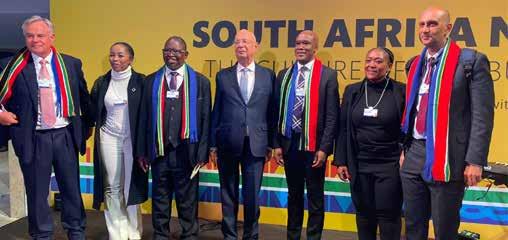
The 53rd Annual Meeting of the World Economic Forum (WEF) in Davos, Switzerland, concluded on Friday, 20 January 2023.
World leaders and corporate executives expressed hope that the looming recession facing the global economy could be avoided
if countries collaborated to boost global trade and investment.
A high-level South African government and business delegation has returned home from the meeting more upbeat than before that the current economic slow-
Ghana with the aim to resolve these disputes on a mutually acceptable basis".
Tullow is the second multinational company to dispute a tax bill from the GRA this month.
Tullow reported revenues of £1.38bn ($1.7bn) in 2022, at an average realised oil price post-hedging of $87 per barrel,
This was ahead of guidance and driven by the increased equity interest in Ghana ($126m) and excluded the impact of the

Tullow is now presenting a guide for the 2024-2025 period – if an oil price of $80 a barrel is realised.
“Strong operational delivery, rigorous focus on costs and capital discipline, the increased equity
Ghana and higher oil prices drove material, expectation-beating free accelerating the group’s deleveraging towards a net debt to EBITDAX ratio of 1.3 times by the year-end,” said Tullow Oil Chief Executive, Rahul Dhir.
be resolved if nations addressed global supply disruptions that are leading to commodity shortages and driving up energy and food prices.
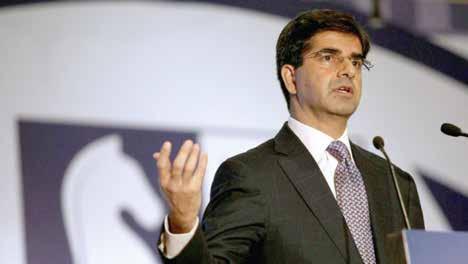
The delegation was led by Minis-
ter of Finance, Enoch Godongwana, who was accompanied by leaders of South Africa’s major corporations operating in various sectors of the economy. The delegation also included Minister of Trade, Industry and Competition, Ebrahim Patel; Minister of Inter-
economy.
national Relations and Cooperation, Naledi Pandor; and Minister of Human Settlements, Mmamoloko Kubayi.
This year’s WEF Annual Meeting was held under the theme “Cooperation in a Fragmented World” and covered many interconnected topics including the impact of the ongoing Russia-Ukraine war on the commodity markets, skyrocketing cost of living caused policy tightening by central banks, climate change, and thegence (AI) on workplaces and labour markets.
“The South African delegation did a fantastic job in Davos where it sold our country to global investors as a favourable market to do business and invest in. Notwithstanding the energy supply constraints that our country is currently grappling with, South Africa remains an attractive investment destination given its excellent infrastructure, sophistiskilled workforce,” says Sithembile Ntombela, Acting CEO of Brand South Africa.
The South African government is currently implementing structural reforms that have opened the energy sector to private investment to boost energy generation and bring an end to load-shedding that is constraining the econ-
omy.
“The structural reforms that are currently being implemented by the government are making progress in removing investment bottlenecks and reducing the cost of doing business. These reforms will enable South Africa, a preferred destination by local investors and global multinationals looking to expand across Africa, to take advantage of the opportunities presented by the African Continental Free Trade Area (AfCFTA),” says Ntombela.
launched in 2021, will create the world’s largest free trade area, stimulate intra-African trade, develop regional value chains, and promote industrialisation across the continent.
The AfCFTA Secretariat and WEF revealed in a report unveiled at this year’s Davos meeting that AfCFTA is projected to create single market that will grow to 1.7 billion people and $6.7 trillion in consumer and business spending by 2030.
By 2050, the continent is estimated to be home to 2.5 billion people and a market with a combined business and consumer spending of $16.12 trillion.
The report titled “A New Era for Global Business and Investment in Africa” lists four high-potential sectors that hold lucrative oppor-
tunities for companies looking to invest in Africa.
These sectors are automotive, agriculture and agro-processing, pharmaceuticals, and transport and logistics, which are all expected to see rapid growth in terms of production and trade volumes under AfCFTA.
“Given that South Africa is the most industrialised and sophisticated economy in Africa, it is well positioned to take advantage of opportunities presented by AfCFTA. The development of the free trade area will require massive investment in logistics and telecommunications infrastructure to reduce the cost of doing business and enable free movement of people, goods and services,” explains Ntombela.
With the green energy transition and digital transition in full motion around the world, the delegation that represented South Africa at WEF2023 expressed support for calls to reskill and upskill workforces, particularly the youth, to prepare them for future workplaces and to mitigate job losses.
The delegation is impressed by the progress made by the WEF’s Reskilling Revolution; an initiative launched in 2020 to empower 1 billion people. So far, the initiative has reached 350 million people.
Climate change also took centre stage at WEF with world leaders and business executives committing themselves to supporting the implementation of the Paris Agreement, which calls on all countries to cut carbon emissions to limit global warming to around 1.5 degrees celsius and strive towards attaining net zero emissions by 2050.
This commitment requires countries and businesses to move away from using fossil fuel energy sources like coal and crude oil and adopting clean and environmentally friendly energy sources such as wind and solar power.
The launch of the new Coalition of Trade Ministers on Climate, which brings together over 50 countries, was also a highlight of this year’s WEF annual meeting.
The coalition aims to tackle climate change by promoting trade and investment that encourages adoption of goods, services, and technologies that mitigate climate change in both developed and developing countries.
“However, the global challenges that were highlighted at WEF 2023 cannot be resolved in a fragmented world in which countries These challenges require collaboration and unity by the nations of the world, where counties are in an integrated global economy,” concludes Ntombela.
– is a nation like no other.
Australia Day, marked on January 26 every year, is an occasion to celebrate contemporary Australia means to be Australian, and acknowledge our history.
It was on January 26, 1788 that the First Fleet of 11 convict ships arrived in Sydney Harbour from permanent settlement of Europeans on Australian soil.
The Commonwealth of Australia itself came into being on January 1, 1901.
But that is just the most recent part of our story – because prior to European settlement, Australia was settled by indigenous Australians for many millennia – according to some scholars for as long as 60,000 years – the world’s oldest continuing civilisation. World’s sixth largest country Australia – a continent and the sixth largest country in the world
It is one of 17 countries that together account for more than 70 per cent of the world’s species.
We are also home to almost 10 per cent of the world's biodiversity, from tropical rainforest in the north, to the red deserts of the south-east.
Modern Australia is a thriving nation, a G20 member with the in its own region – the Indo-Pacific – and with global interests and partnerships.
We have a highly skilled workforce and some of the highest living standards in the world.
Australian cities are regularly listed in the top ten most liveable cities in the Economist Intelligence Unit’s global liveability index.
Innovation is in our DNA, and
drives Australian enterprise, science and research sectors as well as responses to global crises.
our varied origins. Australia is home to people from more than
We are an egalitarian nation whose citizens share common ground with so many of the world’s peoples.
The world has come to Australia, and as a result, Australia is profoundly connected to all regions of the world through family, ethnic and cultural ties. This is an asset – an element of national power – that few countries can match.
Today, more than 7,500 Ghanaians call Australia home. As well as deep people-to-people links, we have a long-standing bilateral relationship with Ghana
countries in the world to recognise the newly independent Ghana in 1957.
This relationship is underpinned by cooperation through the Commonwealth and other international organisations, as well as shared values and interests including in supporting the international rules-based order; free trade and investment; and action on climate change.
Ghana’s commitment to peace Australia particularly values Ghana’s commitment to peace and security on the international stage – including during its current tenure on the United Nations Security Council – and in the region.
We share concerns over the growing threat of terrorist activity in the Sahel and appreciate the challenge this is presenting for coastal states.
We are helping build capacity in
We
countering terrorism and violent extremism including through the International Counter-Terrorism Academy in Côte d’Ivoire and the Morocco.
The annual West Africa Mining Security Conference, organised by the Australian High Commission in Accra, also brings together subject matter experts, security practitioners, academics and the mining industry to discuss regional trends and operational challenges.
Australia’s investments
Our commercial links are also Australia’s investment in the mining sector.
Australian companies are involved in every aspect of the industry, from surveying and exploration, mine design and construction, to contract drilling
and excavation.
cant role in the development of Ghana’s extractives sector.
For example, Australian mining exploration company Atlantic Lithium is developing what will Australian companies have an excellent track record of initiatives aimed at improving the infrastructure and social welfare well as transferring knowledge, skills and expertise to their Ghanaian workforce – many of whom are now in key mining positions right across Africa and in other parts of the world.
With Australian mining companies’ current and prospective investment across Africa estimated at over $40 billion Australian Dollars (AUD), this fruitful partnership will continue.
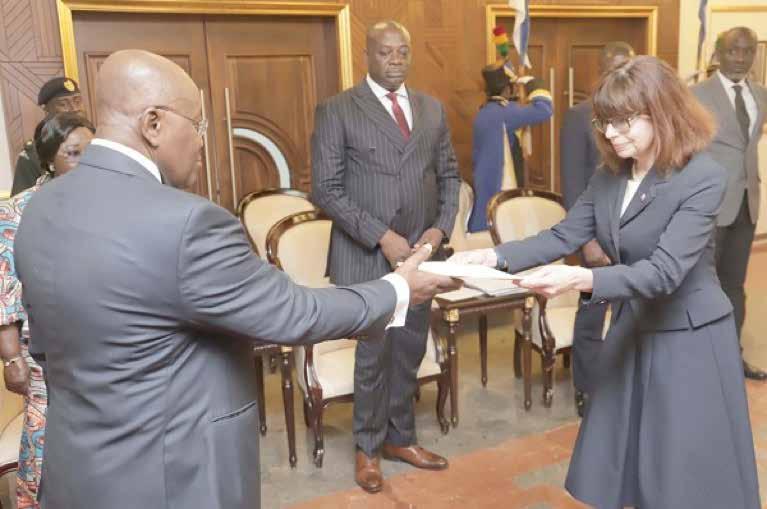
Since 2004, in Ghana and across West Africa, the Australian High Commission has delivered over 200 projects through our Direct Aid Programme, bringing tangiin the areas of health and sanitation, education and skills training, human rights, income generation, renewable energy and women’s economic empowerment.
In the last two decades the Australian Government has also supported over 400 Ghanaians to undertake study, research and professional development at premier Australian tertiary institutions through the Australia Awards programme. These scholars were able to tap into Australia’s leading-edge policy, health, agricultural tech-
nologies, renewable energy and mining, and have returned to Ghana with knowledge, skills and workplaces and communities.
Collaboration with Ghana
These links contribute to our collaboration with Ghana and other African countries in responding to the challenges of climate change, food insecurity, water scarcity and energy transition.
More broadly, education is a promising avenue for Australia and Ghana to continue to further develop our relationship.
Australia has a world class-education system and is the world’s third most popular destination for international students.
Looking to the future, there are exciting times ahead for Australia in Ghana, as the Australian Government reinvigorates ties with Africa.
Just last month, Australian Assistant Foreign Minister the Hon. Tim Watts’ visit to Ghana underscored that we have important bilateral, strategic and economic interests.
Strengthen our partnership
We will continue to strengthen our partnership to promote an international system governed by rules; to combat terrorism; to tackle climate change; to develop our economic links; and share knowledge and skills.
Australian mining companies will continue to contribute to Ghana’s economic development.
At the same time, we will diversify our economic links, and take up opportunities in education, green energy, food and agriculture, as well as science and technology.
Australia and Ghana are on the opposite sides of the world but together we can continue to overcome the tyranny of distance.
Seventy-four years ago today (January 26, 2023), India became a Republic, adopting a Constitution deep-rooted in its civilisational values, culture and heritage. It paved the way for an independent India to tread steadfastly, dealing with all the challenges resulting from its colonial past on the path of national development. And, after more than seven decades of its journey, the Indian Republic is, today, celebrating 75 years of independence with a celebration of its achievements and new resolve to work harder to scale the new heights so that India @100 would be the nation which the founders had dreamt of. Strong democracy
Today, India is rapidly emerging as the strongest democracy in the
world.
It is not only the largest democracy population-wise, but also the most vibrant and functional democratic governance system globally. Its polity is comprehensively representative of a large and diverse nation, both vertically and horizontally, which means there is not a section of the society or a region of the country which has no political representation.
Indian’s 1.4 billion people strongly believe in the spirit and tenets of the idea of India, with enthusiastic and wholehearted participation in electing their representatives from time to time.
Elections in India are not only the largest such exercise in the world, but also the only one which is now digital in nature, since the voting is
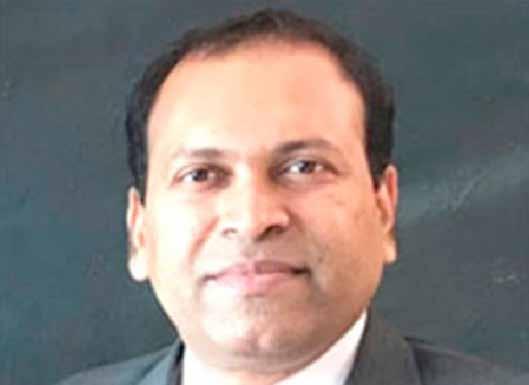
100 per cent electronic.
This is not a mean achievement for a huge and diverse country like India, which was destroyed by the centuries of oppression of foreign rule and colonisation.
This was possible not just because of the spirit and grit of Indian people, but because of the toil of the members of the Constituent Assembly in laying the strong foundation to build the Republic, and that is why when India is celebrating 75 years of independence, it is also the time to celebrate the success of Indian Republic.
New global economy
On such strong foundation, a new India is being built, which has emerged as the new global economic powerhouse presently, as the 5th largest economy of the world.
It is expected that by 2028, India will be the 3rd largest economy and by 2047, when India becomes 100 years old since its independence, it will be a $26 trillion economy.
India’s economic achievements are the direct result of its credentials as a Republic.
India’s Republic is held high and celebrated by its more than one billion young people.
As the largest young nation in the
world, India focuses in a big way on technology, innovation, creation and futuristic vision.
It is fast emerging as the manufacturing hub for the world.
It is already the pharmacy of the world and soon will be the knowledge capital of the world.
With more than 90,000 registered start-ups and more than 100 Unicorns, it is already the third largest start-up eco-system in the world.
Putting in place such an eco-system is bound to unleash new energies of the young Indians. Despite the COVID-19 pandemic, which badly hit a big and diverse country like India, it is the fastest growing major economy in the world.
worthy global supply hub which will not allow for a disruption of the supply chains if the pandemics are to reoccur in future.
This sense of global responsibility comes from the tenets of the Indian Republic.
Transformation
The Republic celebrates the transformation leading to huge growth, and at the same time, ensures that it is balanced with inclusion and sustainability.
Inclusion, both vertically and
Huawei Ghana has been adjudged one of Africa’s top employers in Sub-Saharan Africa namely South Africa, Kenya, Nigeria, Zambia, Angola, Botswana, Mauritius, Uganda, Mozambique and Tanzania, at the 2023 Top Employer Awards.
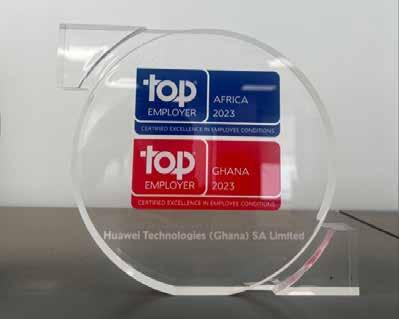
The company has seen its countryer Institute's Top Employer rankings grow from nine in 2022 to eleven this year, and has even been accredited as the Continental HQ Top Employer for 2022 in Sub-Saharan Africa. The increased representation in the prestigious annual rankings is a testament to the work Huawei has put into employee wellbeing across the region over the past 12 months.
showcases an organisation’s dedication to a better world of work and exhibits this through excellent HR policies and people practices. The Top Employers Institute
horizontally, i.e. through all the sections of the society and through all the regions of India, is an important value of the Indian Republic, which has been the touchstone of the developmental
At the same time, the Republic ensures that the developmental attention given to mother nature. With all these strengths of the Indian Republic, India readies itself to take the mantle to be a leader of global growth and prosperity.
India’s leadership is deep-rooted in its civilisational thoughts of “Vasudev Kutumbakam” i.e. considering the whole world as one family.
-
India’s commitment is towards the well-being of the whole of humanity, transgressing all boundaries. While celebrating the achievements of 75 years since independence, India would like to share it with the whole world, especially with the partners and the friends in the Global South.
In this regard, during its present G-20 Presidency, convening the “Voice of the Global South Summit” by India was immensely It clearly brings out the spirit of
inclusion that India would like to push for in global growth and prosperity.
Certainly, this comes from India’s experience as a Republic.
Ghana as an old and close partner achievements, lessons and experiences of the Indian Republic.
India values its friendship with partners, including Ghana, while it moves on in its global leadership.cance and importance to its commitment as the prime partner of Africa and Ghana in their national development by working together to build their capacities.
and as
India has demonstrated its commitment by taking deliberate and socio-culturally, and establishing itself as one of the largest trade, investment and development partners of Ghana, bringing the two countries and the two peoples together.
When we are celebrating the 74th Republic Day today, India is looking forward to deepening that commitment with reinvigorated
The writer is the High Commissioner of India to Ghana
tions based on the participation and results of their HR Best tices Survey. This survey six HR domains consisting topics including people strategy, work environment, talent acquisition, learning, diversity, equity & inclusion, wellbeing and more.
Commenting on the award, the Human Resource Director for Huawei Ghana, Mr. Chen Xuli said, “We are honored to being exceptional employee experirecognition of Huawei Ghana’s commitment to the development of its workforce and the provision and practices for its employees.”
“At Huawei, we believe in creating an environment of professional growth, innovation and employee engagement and have consistently implemented a number of policies and practices to ensure that our employees have an opti-
include career development opportunities and a safe and inclusive work environment.
“Through systematic trainingent stages of their career, get to learn the skills they need, adapt to their new roles and quickly grow. Huawei will continue to strive to create an exceptional employee with the tools and resources necessary to excel in their roles.” He added.
Human Resource Director for Huawei Southern Africa Region, Mr. Yu Chen indicated that, Huawei is proud to have seen improvements in its rating for employee wellness, which is due to programmes designed to enhance the physical and mental health of employees.
Leadership EmployabiliAdvancement and Possibility program, Huawei, partICT industry players and successfully connected 200 fresh to industry relevant jobs The company has trained 10,000 tertiary students in ICT Academy initiative to them with the requisite skills and prepare them for market. Between 2021 and 70,000 young girls and traders have been trained Financial Technology (FinIntelligence, Privacy Protection, Data Storage & Transfer and Coding with them aim of leaving no one behind in the digital journey.
Top Employers Institute CEO David Plink says, “Exceptional times bring out the best in people and organisations. And we have witnessed this in our Top Employyear: exceptional performance 2023. These employers have always shown that they care for the development and well-being of their people. By doing so, they collectively enrich the world of work. We are proud to announce and celebrate this year’s group of leading people-oriented employers: the Top Employers 2023.”
The Bank of Ghana’s Regulatory and Innovation Sandbox will be opened for admission between February 13- March 14, 2023.
Launched in August 2022, the Regulatory Sandbox is tool aimed at harnessing the potential of stability.
More importantly, it is expected to serve as an enabling framework for small scale, live testing of innovations by innovators (operating under a special
exemption, allowance, or other limited, time-bound exception) in a controlled environment under the regulator’s supervision.
It aims at, among others, fostering a deeper understanding of innovative products, services and business models by the regulator, allowing for potential improvements to legal and regulatory requirements to encapsulate emerging technologies, and ensuring careful monitoring and containment of any risks that
may emerge.
The Regulatory Sandbox is open
tions (Banks, Specialized Deposit-taking Institutions, Payment Service Providers, Dedicated Electronic Money Issuers, Financial Holding companies and other Non-Bank Financial Institutions) and unlicensed FinTech start-ups that have innovative products, services or business models that meet the Regulatory Sandbox requirements. In a release issued by the central
bank, it said the Sandbox was now open from February 13cohort of participants.
window, would largely accept innovations from priority areas such as; payments; remittances; crowdfunding; and micro-lending.
It said prospective participants would be informed of the outcome of the application within twenty-one (21) working days after the closure of the application window on 14th March 2023.
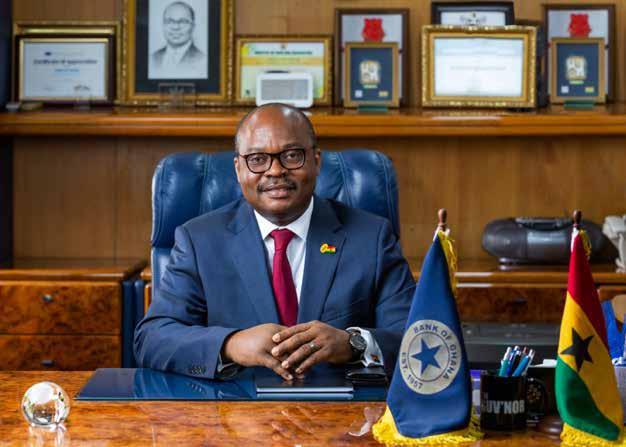

In the eighth episode of the Vodaurologist Dr Bernard Morton explained that even though men may not have a “biological clock,” fertility in men is not eternal.
The doctor told the show's host, Frema Asiedu, that the quality of sperm changes with age, certain genetic disorders or diseases, and toxins in the body. This is why men's potency levels go down. Dr Morton said factors such as one’s sperm count, how the sperm moves in the female reproductive system, and the overall man's fertility.
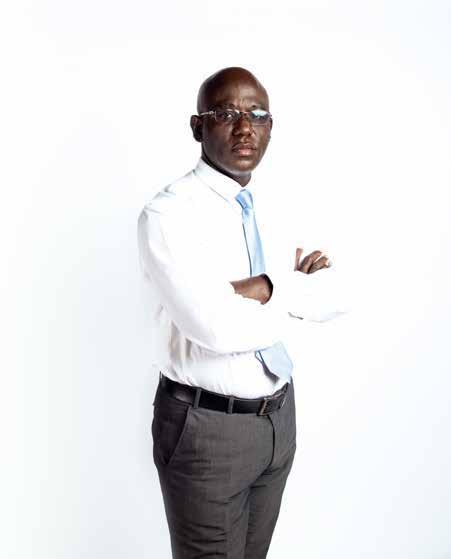
He noted that the quality of these factors may, however, be impacted as one gets older. So, even though a man may be producing sperm throughout his life, theence his fertility.
The doctor also mentioned that a condition known as “varicocele” could lead to infertility in men. He explained that “varicocele” is an abnormal growth of the veins in the scrotum, which alters sperm production, leading to a low sperm count and, eventually, infertility.
The urologist advised men not to self-medicate and encouraged them to always talk to a doctor if their sperm count was low.
“Seek the help of an expert in this
situation. Be careful cation, which worse. Research certain medications, count. So, it is the help of an expert,” he said. In the Myth in-house doctors and Aba Folson myth that eyesight. Dr Yalley that “even though ponent of Gari eyesight is totally false.”
Dr Aba Folson best to take in and vitamins for good eyesight.
Frema Asiedu Kitchen segment
pepper. She added help in weight heart.
Through the line show, Vodafone provided free and interventions ian public. giving out useful through interesting selected media media.
The Vodafone
Mondays from 10:00 p.m. and days from 6:00 p.m. to 6:30 p.m.
1000 Africans for tech scholarship in collaboration with Utiva
enrolled young Africans between the ages of 18-35 from 19 countries, providing them with a platform to learn technology skills for a 12-month duration.
Binance Charity, the philanthropic arm of Binance, the world’s leading cryptocurrency and blockchain infrastructure provider, and Utiva, a technology education company in Africa that helps young people learn tech skills, today announced that they have selected the 1,000 Africans who will be taking part in a free 1-year intensive skill training program.
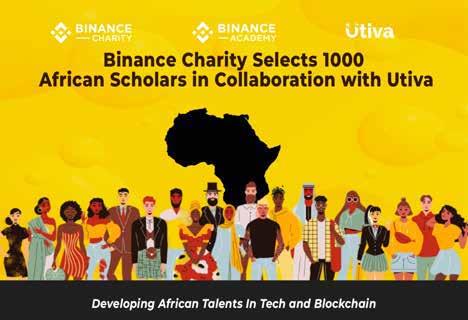
The scholarship year is set to kick virtual launch day.
As unemployment rises across the continent, Binance and Utiva remain committed to providing digital education to enable more Africans to explore global career opportunities and secure roles as tech professionals.
This scholarship program has
Classes have been designed for beginners in collaboration with Binance Academy and include skills such as web development, front-end development, full-stack development, cloud computing and blockchain modules.
Binance Academy will further support this initiative by providing Web3 crash-course content to recorded training sessions to
Utiva instructors. Upon completion of the program, students will
successfully completed the program.
“Today, we’re celebrating the 1000 students selected for full scholarships as part of our Binance Charity Scholar Program. This is our most ambitious education outreach to date in the region and the overwhelming positive response further bolsters Africa as a key hub for emerging tech talent. We’re so excited for these young people, as they embark on
an exciting new career journey,” said Helen Hai, VP of Binance and Head of Binance Charity.
Angela Naa Yaboley Okantey, a Ghanaian scholar, said: “I am very excited to have been selected for this scholarship program because it will provide me withties to pursue my professional goals in the tech space as well as interact with other like-minded individuals. Overall, I believe that this scholarship would be an invaluable investment in my future and enable me to be a part of an industry reshaping the world.”
Renee Ovwigho, a Nigerian scholar, said: “I am thrilled about this opportunity because it would push me toward a successful career in Data Analysis. With many industries adopting blockchain technology recently, this would enable me to learn and provide me with the opportunity to make meaningful contributions to society.”
Miracle C. Amakom, a Cameroonian scholar, said: “As an engineering student, I've been on the
lookout for reputable programs to get great training and professional development and I am super excited to be a part of this. Looking forward to my journey of becoming a full stack developer as this has always been my passion.”
The programme includes students across Nigeria, Senegal, Ghana, Cameroon, South Africa, Rwanda, Kenya and more. The collaboration aims to build a path for economic prosperity for the continent through skill training and access to vast job opportunities in the technology and Web3 sectors.
This project is part of the wider Binance Charity Scholar Program, enabling the next generation of digital leaders to develop their skills, knowledge barriers. Applications to study as part of this program have surpassed 80,000 worldwide since June last year.
Binance Binance is the world’s leading blockchain ecosystem and cryptocurrency infrastructure provid-
that includes the largest digital asset exchange by volume. Trusted by millions worldwide, the Binance platform is dedicated to increasing the freedom of money for users and features an unmatched portfolio of crypto
tion, data and research, social good, investment and incubation, decentralization and infrastructure solutions, and more. For more information, visit: https://www.binance.com.
Binance Charity
organization dedicated to the advancement of blockchain-enabled philanthropy towards achieving global sustainable development. Binance Charity aims to transfer philanthropy by developing a 100% transparent donation platform based on blockchain to build a future where technology innovation is used to end all forms of poverty and inequality, advance sustainable development and ensure
that no one is left behind. To date, Binance Charity has supported through various projects. For more information, visit: https://www.binance.charity/ Binance Academy Binance Academy is a leading blockchain and cryptocurrency education platform featuring hundreds of hours of content on blockchain, cryptocurrency, Web3 and more. Launched in 2018, it serves millions of learners across the world in more than 25 languages. All content on Binance Academy is completely free. With no advertisements, no requirement for payment or registration, everyone can learn at their own pace and even earn free crypto through learning by taking part in the Learn and Earn program. Other educational initiatives of Binance Academy include the University Outreach Program, Student Ambassador Program, partnerships with top online learning platforms, professional associations, industry alliances, and others.
“This emission reductions payment will further promote process for action to reduce deforestation and forest degradation while empowering local community livelihoods. The road to global 1.5 degrees cannot be achieved without healthy standing forests, and Ghana is committed to making it possible.”
ing bring change to the cocoa sector, but they are also helping Ghana meet its national emissions reductions commitments under the Paris Agreement. This level of -
Ghana country in Africa after Mozambique to receive payments from a World Bank trust fund for reducing emissions from deforestation and forest degradation, commonly known as REDD+. The World Bank’s Forest Carbon Partnership Facility (FCPF) paid Ghana $4,862,280 for reducing 972,456 tons of carbon emissions for the program (June to December 2019).
under the country’s Emission Reductions Payment Agreement (ERPA) with the World Bank to demonstrate potential for leveraging results based payments for carbon credits,” said Pierre Laporte, World Bank Country Director for Ghana, Liberia, and Sierra Leone. “Subject to showing
to reduce deforestation, Ghana is eligible to receive up to $50 million for 10 million tons of CO2 emissions reduced by the end of 2024.”
These actions are within a six-million-hectare stretch of the West Africa Guinean Forest, where biodiversity and forests are under pressure from cocoa farming and unsustainable harvesting, and small-scale mining. Ghana is one of 15 countries that have signed ERPAs with the World Bank.
“The many years of dialogue, consultations, and negotiations with local communities, traditional authorities, government agencies, private sector, CSOs,
Samuel A. Jinapor, Minister for Lands and Natural Resources.
Ghana is the world’s second-largest cocoa producer. Cocoa drives the economy, but it is also one of the main causes of deforestation and forest degradation in the southeast and western regions of the country. Stakeholders are working to help some 140,000 Ghanaian farmers increase cocoa production using climate-smart agro-forestry approaches, rather than slash and burn land-clearing techniques that decimate forests. More sustainable cocoa farming helps avoid expansion of cocoa farms into forest lands and secures more predictable income streams for communities.
Ghana’s Cocoa Board is participating in the REDD+ process, as are some of the most important cocoa and chocolate companies in the world, including World Cocoa Foundation members like Mondelēz International, Olam, Touton, and others. Their combined actions are not only help-
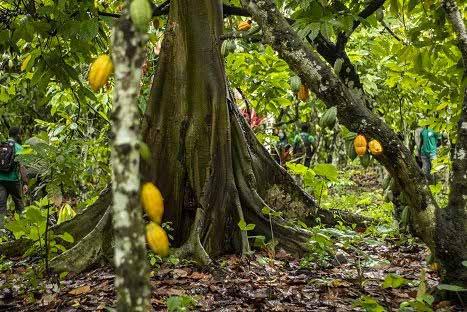
pinning Ghana’s’ ERPA with the World Bank. Prepared through extensive consultations with local stakeholders and civil society organizations throughout the country, the plan ensures all participating stakeholders are fairly recognized and rewarded for their role in reducing emissions.
The Forest Carbon Partnership Facility (FCPF) is a global partnership of governments, businesses, civil society, and Indigenous Peoples' organizations focused on reducing emissions from deforestation and forest degradation, forest carbon stock conservation, the sustainable management of forests, and the enhancement of forest carbon stocks in developing countries, activities commonly referred to as REDD+.
Launched in 2008 the FCPF has worked with 47 developing countries across Africa, Asia, and Latin America and the Caribbean, along with 17 donors that have made contributions and commitments totaling $1.3 billion.
Is globalization coming back to life? That was the big question at the World Economic Forum’s annual meeting in Davos, where WEF founder Klaus Schwab asked whether it is possible to have cooperation in an era of fragmentation.
For the past decade, the steady demise of “Davos Man” – the avatar of global business and cosmopolitanism – was the big story here, owing to the 2008 Trump’s election, democratic backsliding around the world, COVID-19, and Russia’s war in Ukraine. All were seen as signs that globalization had gone too far and would be thrown into reverse.
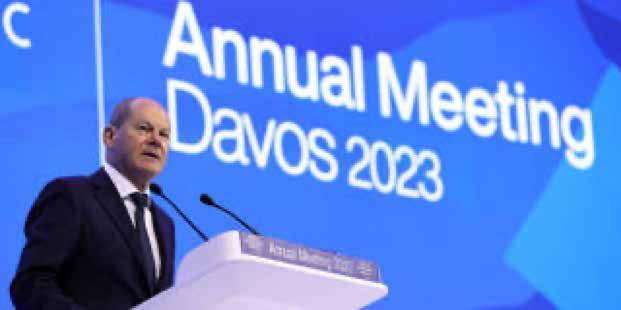
But the mood at this year’s meeting was slightly more optimistic. Despite much concern about world seems to be doing a little better than global elites expected when they last met in May. The Ukrainians are valiantly resisting the Russian invaders, the West is united, Europe has managed to keep the lights on this winter, and some think we might still avoid a recession.
Moreover, beneath these important short-term developments is a more profound shift toward a new form of globalization, albeit from what preceded it. While the globalization of goods seems to have peaked, services are becoming ever more globalized, owing to the revolution in telework during the pandemic. There is also an accelerating revolution in energy, driven partly by the war in Ukraine. European Commission President Ursula von der Leyen and German Chancellor Olaf Scholz predict that the widespread
adoption of renewables and hydrogen power will be as significant as the Industrial Revolution of the nineteenth century. At the same time, advances in vast new possibilities, while also creating tensions over microchips and renewed fears about joblessness and rogue robots.
Developments in all three areas –telework, renewables, and AI –will bind countries together in new networks of interdependence. As a recent McKinsey Global Institute report shows, “no region is close to being
But the re-globalization glimpsed in Davos will be fundaiterations. First, while the old model was about corporate profits, the new one is about national security in all its dimensions. Western countries have portrayed the war in Ukraine as a defense of the liberal, rules-based order against unilateral aggression by Russia (and, by extension, China). They are therefore busy decoupling from Russia and rethinking their economic ties with China. In Davos, Canadian Finance Minister Chrystia Freeland was just one of many policymakers who stressed the need for “friend-shoring.”
But to many outside the West, Europe and America are just as guilty of disrupting the global order as Russia and China are –and with enormous consequences for their own security and prosperity. The way they see it, the West made a decision to turn the war into an economictious and far-reaching sanctions package in history) with devastating consequences for billions
of people. Back in Davos’s halcyon days, was seen as a global public good that would spread prosperity to every corner of the world. But now it is increasingly seen as a cudgel with which America can enforce its ideological and strategic preferences. The sanctions on Russia follow the same pattern of Western policies used to prosecute the “war on terror” and thetion in Iran and North Korea. As the French bank BNP Paribas learned in 2014, when it was violating US sanctions, such policies have become a global relies on the outright politicization of global systems that were previously considered neutral (in principle if not in fact).
Now that the genie has been let out of the bottle, others are also politicizing the global framework of rules and norms. The European Union, for example, is considimports, and it has already taken measures to prevent data on its citizens from being stored beyond its borders.
The United States, for its part, has only doubled down, such as by imposing sweeping bans on the sale of strategically important technologies to China. The result is not simply a balkanization of knowledge. All countries are now going to greater lengths to guard against the risks of interdependence.
ate the next age of globalization may prove even more consequential. Whereas Britain and America were, respectively, at of globalization, this new one will
be multipolar and thus multi-ideological. China has not only closed the economic gap with America, but has surpassed it as the biggest trading partner to most countries in the world. That implies a major shift in the balance of economic power. This new dynamic suggests that the world will be divided not only by nationalism but by fundamen-
illustration of this when Ukrainian President Volodymyr Zelensky beamed in to deliver a speech calling on the world to rally against Russia’s unprovoked war. While half the audience cheered enthusiastically, the other half appeared unmoved. Even if many sympathize with the Ukrainians, they fear that thetate a Cold War 2.0 that will divide the world into democracies and autocracies.
That is the last thing most political leaders want. In private discussions, African, Middle Eastern, and Latin American leaders complain that their countrieseignty and control during the little to be gained from having to pick sides yet again.
Even America’s allies are against having to choose. I spoke to a Japanese tycoon who is very worried about China’s current foreign policy but also vehemently opposed to decoupling. And in his own speech to the conference, Scholz declared that the world of 2045 would not be bipolar but multipolar.
Ultimately, Schwab may be right to hope for cooperation in our time of fragmentation. But we must bear in mind how the nextmentally from the last one.
ing international content or continent from home when they’re abroad – as it is for anyone else around the world. As such, we look forward to growing our presence in Ghana and building our user base in one of Africa’s most exciting and innovative digital markets.”
The Hola Browser, a browser which includes a 100% free peer-to-peer virtual private network (VPN) built-in, this week giving internet users in the country the freedom to explore a world’s worth of online content, unlimited, for free.
Hola, accessible across a wide range of platforms and devices
and allows its more than 259 million registered users to access almost any website and enjoy their favourite movies, TV shows, games, and more; from over 190 countries.
“We believe in fully democratised access to the internet and all the content available on it,” says Avi Raz Cohen, General Manager at Hola. “That’s as true for Ghanaians – whether they’re access-
Already home to a vibrant technology and startup sector, Ghana’s online population is poised future. Currently at 53%, internet penetration in Ghana is expected to rise to more than 66% by 2026. Internet speeds in the country are increasing all the time too. According to Statista, average download speeds in Ghana increased from 2.3Mbps in 2017 to 11.24Mbps in 2022.
“Given the potential freedom available to both new and existing Ghanaian internet users thanks to those increased speeds, it’s critical that they are able to make the most of it,” says Raz Cohen. “That means giving them access to as much of the internet as possible, regardless of where they may be located. The internet has always had the ability to bring people together, but it can do that much better if it’s really open to all.”
As well as its ground-breaking browser, Hola is also available in Freemium form as a browser extension for all major browsers, as a Windows and MacOS app, and as an app on Android and iOS, consoles, and a broad selection of smart devices including smart TVs.

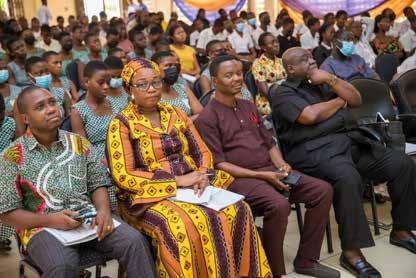 By Baptista S Gebu
By Baptista S Gebu
Youth School, Conference and Exhibitions (AYSCE) was held at the ISSER Conference Centre of the University of Ghana on Thursday January 19, 2023 with over 300 youth, entrepreneurs and business executives participating. This school and conference was under the theme – positioning the African market for sustainable economic development through the African Continental Free Trade Area. Professor Olivia A. Kwapong the Dean, School of Continuing and Distance Education gave the welcome address where Professor Felix Ankomah Asante, the Pro Vice-Chancellor, Research, Innovation and Development, the College Secretary from the College of Education Joseph Oduro Nkansah equally made statements. Dr. Fareed Arthur, National Coordinator of of AfCFTA took turns to address the youth on AfCFTA. The vision bearer of the Youth School, also a director of the Youth School and member of the ANYSC corporate advisory and technical team Mr. Jack Andrews Dotsey delivered his statement on the mission and vision of the Youth School, Conference and Exhibitions. Dr. Simon–Peter Kafui Aheto, also a director and technical committee member helped the Youth to appreciate the youth school’s expectations of the New Year 2023.
The Keynote address delivered by Nana Owusu-Achaw - CEO and Founder of Kings Innovations, looked at opportunities for youth employment and entrepreneurship: zeroing on how the youth can understand and take advantage of the African Continental Free Trade Area. Nana Owu-
su-Achaw admonished young people to seek accurate information about how economies are driven and be aligned accordingly, take our French education seriously as Ghana is bordered by francophone neighbours, learn to volunteer and remember opportunities available in Africa are best found in Africa and not elsewhere. The youth were cautioned to stop holding investments in their pockets by way of investing huge sums into the purchase of mobile phones which could serve as their capital investment, dare not to be programmed to be lazy but to seek information intentionally in-order not to be fed with information they do not desire. The keynote speaker questioned why Ghana is using only 10% of its arable lands and encouraged the youth to start thinking of business ideas, partnership and collaboration to support the AfCFTA one market agenda as they seek information purposively then becoming information consumers.
A panel session highlighting how youth business can be supported and the preparations the Ghanaian Youth can put in place to access an integrated African market saw the likes of Mr. Seth Twum Akwaboah - CEO, Association of Ghana Industries, Ms. Christiana Adu - GRASAG President, University of Ghana, Mrs. Diana Owusu Antwi - Senior Technology Transfer and Intellectual Property Services, University of Ghana prepared the youth whiles the Ministry of Finance provided education on the government’s “YouStart Ghana Initiative”.
The AGI CEO in his remarks was of the opinion that, the youth can start a business and also export their products no matter their ages as patrons of goods do not consider if product are made by young people before they buy. There are opportunities that young people can take advantage of. Do not always look at the big businesses and do not discount the value you get from the small businesses whiles not compromising standards he added. “The right way is to knowing what the standards and requirements are and make sure you meet it. A lot of businesses have succeeded because they belong to a wider network. You do not walk alone as a business. If you do so you don't create opportunities for yourself working alone in a corner and this will see your business die. Be part of an association
Mrs. Owusu Antwi urged the youth to avoid public disclosure of their invention as they might lose the right to protect it. She said they could enter joint ventures with persons who have with their inventions after securing intellectual protection right. "Use a non-disclosure agreement prior to sharing sensitive information about your intellectual property with potential investors or partners," she said. The Agric Investment Lead of the Ghana CARES initiative at the Ministry of the YouStart initiative was set up by the government to empower young people between the ages of 18 and 40 years with technical jobs for the youth. He urged the youth to be daring and take
advantage of such initiatives.

The President of the Graduate Student Association (GRASAG)Ms Adu, advised the students to put their leisure time to good use by acquiring knowledge and skills that would help them to venture into business.
A Mentorship Clinic as well as a leadership and development breakaway session got the youth trained on self-leadership, moral vision, and transformative leadership amongst other topics. Accra Senior High School choir putting up a splendid performance performed several melodious indigenous Ghanaian songs to the admiration of all. The very interesting third edition of the AYSCE was moderated by the author of the book – “Prepare for the Future of Work”.
To this end, the four-day ANYSC which started from Monday, January 16–19, 2023, had its theme on AfCFTA, sub-themes for break out groups, discussions and deliberations provided options for Ghana and other African countries and stakeholders on the continentals ¬al, governance, security, women in trade and digital technolo¬gy preparedness for AfCFTA.
This school and conference was under the auspices of the School of Continuing and Distance Education, College of Educa¬tion, University of Ghana, in collaboration with the Ministries of Finance, Education, Communications and Digitisation, Trade and Regional Integration.


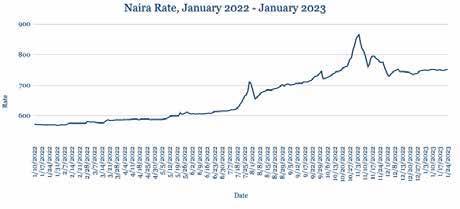
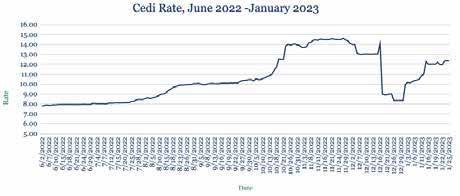
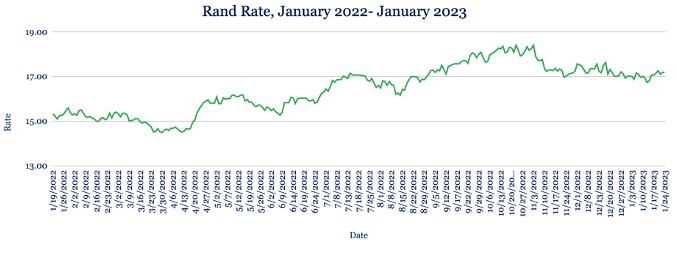
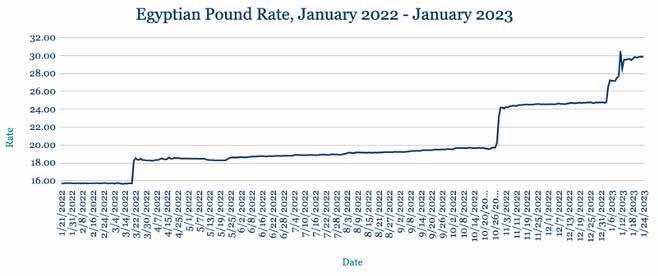
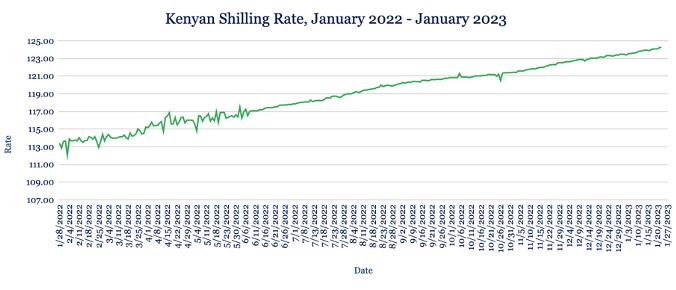
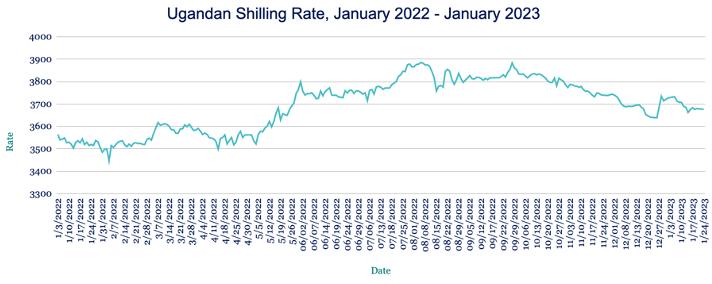
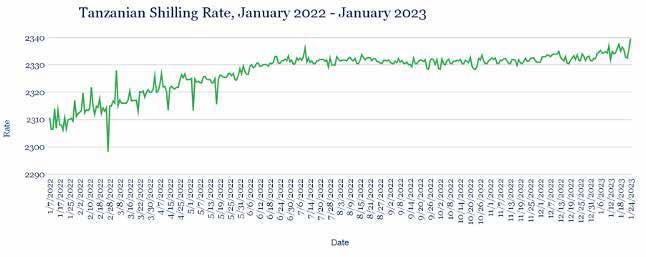
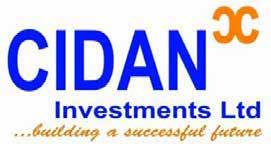
January 20, 2023
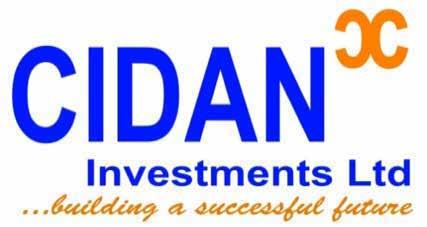
January 20, 2023

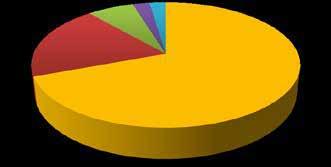
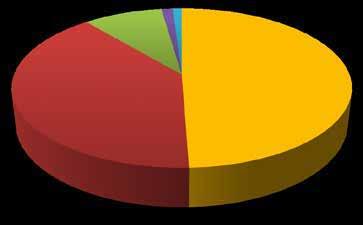

January 20, 2023





January 20, 2023




of policymakers nowadays. In a recent speech, US Treasury Secretary Janet Yellen called on the World Bank and other international lenders to support developing countries struggling with the aggressive interest-rate hikes. And a recent independent report commissioned by the G20 concludes that these institutions are uniquely positioned to help governments achieve the United Nations’ Sustainable Development Goals. The G20 report argues that MDBs could expand their lending without hurting their AAA credit ratings, were it not for excessive capital-adequacy requirements that limit lenders’ ability to take risks. But which countries would
While multilateral development banks play a critical role by providing long-term loans at concessional interest rates to low-income countries (LICs), the overwhelming majority of their countries (MICs). A recent OECD loans went to MICs in 2020, following a large increase in lending to lower-middle-income countries (LMICs).
In other words, the problem is one
tries struggling with extreme poverty and limited institutional capacity. Unlike MICs, most LICs have little to no access to capital markets and are in dire need of -

of the COVID-19 pandemic, the war in Ukraine, and climate change. Why, then, is multilateral lending so skewed toward MICs? The reason is rooted in the MDB lenders like the World Bank, the African Development Bank, and the Inter-American Development Bank rely on their perfect credit ratings to borrow cheaply and lend at higher rates to MICs that have not yet reached investment-grade status or lost it. At the same time, lending to LICs is mostly by direct contributions from shareholding governments to LIC-focused bodies like the World Bank’s International Development Association. Without lending to MICs, the argument goes, the MDB model will not be viable. But with more MICs graduating to investment-grade ratings, multilateral lending could eventually dwindle.
Many LICs have been trying to reduce their dependence on
and geopolitical crises has stalled these plans. In the face of aggressive monetary tightening, most capital markets, leading to painful negotiations with creditors and a looming debt crisis.
Ghana’s recent default could be a calamities. In recent years, the emergence of non-traditional creditors like China has allowed LICs to diversify their borrowing. But the opaque nature of resource-backed loans has raised doubts about the sustainability of have dried up. There are, however, some encouraging signs that China might join the Bretton Woods institutions in allowing LICs to restructure their debts. While MDBs should increase their lending to LICs, doing so is more complicated than many seem to realize. A major obstacle is these countries’ limited absorptive capacity, which leads to a scarcity of bankable projects. Likewise, the fact that most LICs have underdeveloped private sectors investments, particularly for lenders like the World Bank’s Interna-
Monetary Fund’s strict debt-limit policies can impede developing countries’ ability to borrow from MDBs – preventing LICs from accessing dozens of billions of dollars at a time when they need it most.
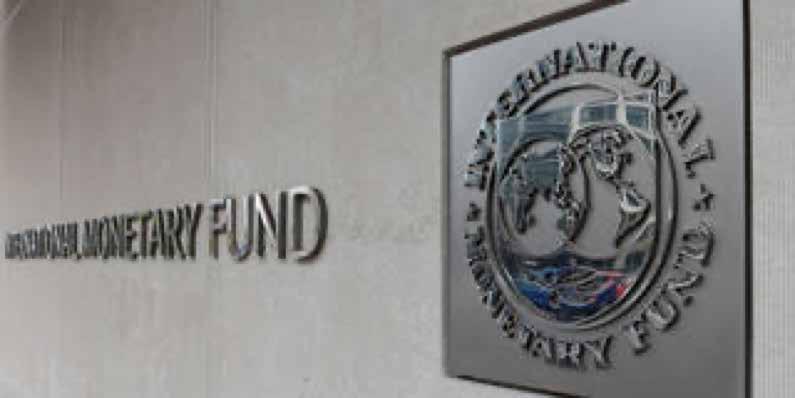
There is no easy solution to this LICs could help to build these countries’ institutional capacities and implement projects. And increased coordination between multilateral lenders and the IMF could help to prevent future bottlenecks. But merely pressuring MDBs to lend more could beductive. For example, lenders could be tempted to prioritize budget support – designed to encourage developing countries to undertake structural reforms that they might have pursued anyway –over longer-term investment projects.
Simply put, lending more is not populations, international lenders must also focus on scaling up meaningful, transformative investments. Then, and only then, will full potential.